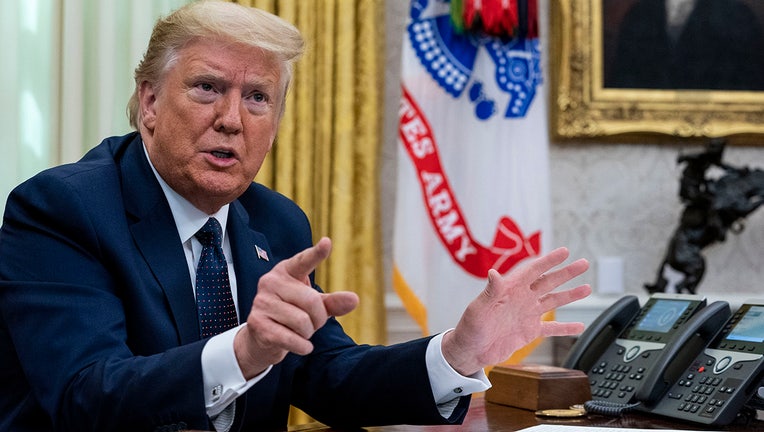Trump’s executive order targeting social media likely to face legal challenge

U.S. President Donald Trump speaks in the Oval Office before signing an executive order related to regulating social media on May 28, 2020 in Washington, DC. Trump's executive order could lead to attempts to punish companies such as Twitter and Googl (Doug Mills-Pool/Getty Images)
OAKLAND, Calif. - President Donald Trump on Thursday signed an executive order targeting social media companies in what he calls a crackdown on censorship.
His sudden action comes days after Twitter began fact-checking the president's tweets and two of them were labeled. UC Hastings Constitutional Law Professor David Levine joined KTVU's The Four and said the president's executive order is likely unconstitutional.
"There's the Communications Decency Act, which was passed about 25 years ago. [1996 to be exact]," Levine explained at a time when the internet was very different and Facebook's Mark Zuckerberg was only 11 years old. "It does grant this immunity to these kind of platforms from liability and there's more room for free speech."
Levine explains part of the problem is because of that statute, the president cannot issue an executive order and change the text of that statute.
"If he wants to persuade Congress that changes are appropriate, he can certainly do that and he certainly would have some support in Congress for that. But he just can't do it himself," Levine said.
The professor continued that it's not so much the constitutionality at this point but that he clearly does not have the authority to do it by himself with an executive order at this point.
However, the president did say he would try to pursue legislation
"He can do that and there is some room for argument as to whether or not there should be more liability on platforms like Twitter or Facebook," Levine said.
Ironically this could hurt the president. The president is a prolific 'tweeter' as Twitter seems to be his social media platform of choice.
"When he says something beyond just surprising or to get a rile out of people, let's take his accusing of a host of another show on a network of murder [referring to Joe Scarborough] when he was a Congressman; well right now, if that's carried on Twitter you can leave it alone and not be responsible for it. But if you're responsible for editorial content, you'd better get it taken down as fast as possible, because otherwise the platform is responsible for defamation," said Levine.
Levine said it's a sure bet that someone like Scarborough would come back with a lawsuit if that were the case. "It could easily backfire on the president. If what the president wants for him to be unfettered, to say whatever he wants to do; what he has in this executive order, legality aside, [is] 180 degrees away from what he should want. He should want it to be wide open. He doesn't want those platforms to be engaging in editorial discretion. He would like it wide open and what he said today is exactly the opposite direction."
Levine argues there would be more censorship of social media platforms under the president's executive order than less.
"What the president seems to be annoyed about is that Twitter in recent days and has added links to what he has said and said, 'Wait a minute. There's another point of view. What the president said isn't necessarily factual.' That's what he doesn't like."
Levine said what Twitter did was not censorship and that it added more speech to speech, which is usually the antidote to speech you don't like.
The president's executive order is likely to face a legal challenge.

